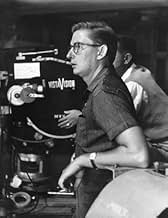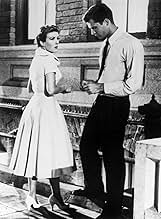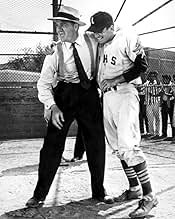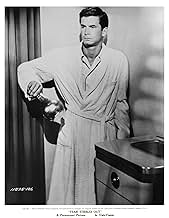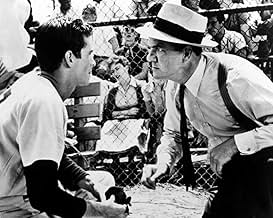CALIFICACIÓN DE IMDb
6.9/10
2.3 k
TU CALIFICACIÓN
Agrega una trama en tu idiomaTrue story of the life of Jimmy Piersall, who battled mental illness to achieve stardom in major league baseball.True story of the life of Jimmy Piersall, who battled mental illness to achieve stardom in major league baseball.True story of the life of Jimmy Piersall, who battled mental illness to achieve stardom in major league baseball.
- Dirección
- Guionistas
- Elenco
- Premios
- 1 nominación en total
John Aberle
- Ballplayer
- (sin créditos)
Eric Alden
- Policeman
- (sin créditos)
Heather Ames
- Nurse
- (sin créditos)
Sam Balter
- Broadcaster
- (voz)
- (sin créditos)
Mary Benoit
- Nurse
- (sin créditos)
John Benson
- Reporter
- (sin créditos)
Don Brodie
- Reporter Evans
- (sin créditos)
Richard Bull
- Reporter Slade
- (sin créditos)
Bart Burns
- Joe Cronin
- (sin créditos)
Edd Byrnes
- Boy in Car Assisting Jimmy Up Stairway
- (sin créditos)
Wade Cagle
- Intern
- (sin créditos)
Keith Coyne
- Baby
- (sin créditos)
Opiniones destacadas
As a previous reviewer said Anthony Perkins did not exactly look like Frank Merriwell out on the field during the baseball scenes, but the film is about the true story of Boston Red Sox centerfielder Jimmy Piersall who sustained a nervous breakdown and then came back to have a pretty respectable major league career.
Showing the personal road Piersall took towards that breakdown is where Anthony Perkins gives one of his great film performances. This film is a lot like I'll Cry Tomorrow where Jo Van Fleet was pushing the career of her daughter Susan Hayward as Lillian Roth so she could have the success that her daughter had vicariously.
That's where the other great performance in the film comes in. Karl Malden is the baseball father, someone with the same dreams, that his son become a major league ballplayer. Malden's success involved being on his factory team, he wanted more and when he couldn't have it drove his son relentlessly to learn the skills and make the grade. But it was some price for Piersall to pay.
I remember Jimmy Piersall as a player when I was a lad. He played for the Red Sox in the years of the Casey Stengel Yankee juggernaut. He was a good contact hitter, didn't hit much for power, but played a flawless centerfield. The Red Sox in the Fifties had little to cheer about. There was a pitching staff of Mel Parnell and a bunch of nobodies. There infield was from hunger with the exception of third baseman Frank Malzone who came up in 1956 the last year Parnell played. But the outfield gave New England something to cheer about with Piersall in center, Jackie Jensen in right, and Ted Williams playing with his back to the Green Monster in left. Piersall covered so much ground in center field he made it real easy on both Williams and Jensen. The Red Sox let him go to the expansion Los Angeles Angels in 1961 where he finished his career. Still he's a Red Sox legend.
The story had been previously done on TV's Climax Theater with Tab Hunter as Piersall. In his recent memoirs Tab said that he had hoped to do the screen version. At the time he was involved in a relationship with Anthony Perkins. Unbeknownst to Hunter, Perkins lobbied and got the part in the film. That sort of put a damper on the relationship.
I also echo other reviewers in wishing that some of Piersall's teammates and others in the Red Sox organization had been portrayed. Only Joe Cronin who was the General Manager at the time is shown on the screen. Legendary owner Tom Yawkey is not portrayed and that is a pity.
Interestingly enough Piersall may have gotten his chance with the Red Sox because of Joe Cronin's racist policies. The Red Sox were the last team in the major leagues to integrate. I remember that very well when Pumpsie Green became their first black player two years after Fear Strikes Out was released.
Fear Strikes Out is unfortunately a two person show with Perkins and Malden the only really developed characters in the film. But those are two very talented persons indeed.
Showing the personal road Piersall took towards that breakdown is where Anthony Perkins gives one of his great film performances. This film is a lot like I'll Cry Tomorrow where Jo Van Fleet was pushing the career of her daughter Susan Hayward as Lillian Roth so she could have the success that her daughter had vicariously.
That's where the other great performance in the film comes in. Karl Malden is the baseball father, someone with the same dreams, that his son become a major league ballplayer. Malden's success involved being on his factory team, he wanted more and when he couldn't have it drove his son relentlessly to learn the skills and make the grade. But it was some price for Piersall to pay.
I remember Jimmy Piersall as a player when I was a lad. He played for the Red Sox in the years of the Casey Stengel Yankee juggernaut. He was a good contact hitter, didn't hit much for power, but played a flawless centerfield. The Red Sox in the Fifties had little to cheer about. There was a pitching staff of Mel Parnell and a bunch of nobodies. There infield was from hunger with the exception of third baseman Frank Malzone who came up in 1956 the last year Parnell played. But the outfield gave New England something to cheer about with Piersall in center, Jackie Jensen in right, and Ted Williams playing with his back to the Green Monster in left. Piersall covered so much ground in center field he made it real easy on both Williams and Jensen. The Red Sox let him go to the expansion Los Angeles Angels in 1961 where he finished his career. Still he's a Red Sox legend.
The story had been previously done on TV's Climax Theater with Tab Hunter as Piersall. In his recent memoirs Tab said that he had hoped to do the screen version. At the time he was involved in a relationship with Anthony Perkins. Unbeknownst to Hunter, Perkins lobbied and got the part in the film. That sort of put a damper on the relationship.
I also echo other reviewers in wishing that some of Piersall's teammates and others in the Red Sox organization had been portrayed. Only Joe Cronin who was the General Manager at the time is shown on the screen. Legendary owner Tom Yawkey is not portrayed and that is a pity.
Interestingly enough Piersall may have gotten his chance with the Red Sox because of Joe Cronin's racist policies. The Red Sox were the last team in the major leagues to integrate. I remember that very well when Pumpsie Green became their first black player two years after Fear Strikes Out was released.
Fear Strikes Out is unfortunately a two person show with Perkins and Malden the only really developed characters in the film. But those are two very talented persons indeed.
I don't find movies about illnesses whether they are physical or mental, real or fictitious, to be entertaining, maybe informative or educational, so I am approaching my criticism of this movie from the baseball aspect. Jimmy Piersall was quite a character. He overcame a mental breakdown to become one of the greatest outfielders in baseball history. He was a real crowd pleaser with his fielding and antics, but his hitting left a lot to be desired. He just about ruined his arm showing off how far and hard he could throw the ball. When he hit his 100th homerun, he ran the bases backwards. Living near Boston, I saw him play ball on many occasions and I met him in person at a First National Supermarket opening in Lawrence, Mass. He signed a baseball and a photograph of himself for me, but I had to buy two bags of potato chips (Cains, I think it was) beforehand. As a kid, I could barely afford it, but more than fifty years later, I still have the ball and photo. What a thrill it was! I remember him as being handsome and big and strong, not a skinny guy like Anthony Perkins. As far as the movie goes, it was good, but not very accurate. Did you notice the obvious padding to Perkin's shoulders to make him look bulky? He looked like he never played baseball in real life, he was so awkward. (Gary Cooper as Lou Gehrig and William Bendix as Babe Ruth also looked pretty bad in their baseball movies). Did you notice that the stock footage was of Fenway Park but whenever Perkins was playing they showed some minor league park? Just look at the outfield background, that's not Fenway. What really bothers me is that they only mention one real life Red Sox person, Joe Cronin, and that was wrong, it should have been Pinky Higgins. What happened to Ted Williams, Jackie Jensen (my all time favorite Red Sox player), Dom Dimaggio, Bobby Doerr, Johnny Pesky, and a bunch of others who played on the team with Piersall? Ted's career was actually extended because Piersall was so good as a fielder that he used to run from center to left to catch flyballs so that Williams didn't have to tire himself out trying to get to them. Piersall was eventually traded to another team, so all his euphoria about playing for the Bosox didn't last. Still with all its' faults and disappointments, this movie is well worth watching, especially for baseball fans.
This a very interesting, but not totally factual, account of the life of Jimmy Piersall. Piersall was a popular player with the Boston Red Sox. His antics on and off the field are now legendary. Piersall fell in love with baseball at a young age, but his domineering father forced Jimmy to not only achieve, but to play to perfection. Mr. Piersall's constant manipulating can be traced to his son's mental breakdown.
Anthony Perkins puts in a dedicated performance as Jimmy Piersall. Karl Malden excelled as the relentless Mr. Piersall. Also in the cast are Bart Burns, Norma Moore and Adam Williams.
This is a very stark and interesting movie, just don't take all the content as gospel. A baseball fan's delight.
Anthony Perkins puts in a dedicated performance as Jimmy Piersall. Karl Malden excelled as the relentless Mr. Piersall. Also in the cast are Bart Burns, Norma Moore and Adam Williams.
This is a very stark and interesting movie, just don't take all the content as gospel. A baseball fan's delight.
I still remember seeing this as a Little League-age kid in the theater as our family was vacationing in Florida.
When I saw it again, some 40 years later, parts of the film were still very familiar, a testimony to how powerful some of these scenes were. I never forgot them.
This was a based-on-a-true-life account of major league baseball player Jimmy Piersall, a very talented player who suffered a nervous breakdown. The enormous pressure to succeed that was driven into him by his never-satisfied father was pictured as the cause which made him snap.
Anthony Perkins, who plays Piersall, and Karl Madlen, who portrays his dad, are both excellent, riveting characters. Some say this was Malden's best performance ever. Perkins was no slouch, either. This is the classic sports story of an overzealous parent living his or her dreams through their child.
The baseball segment of this film ended about halfway through. From that point, after Perkins breaks down at the park, climbing the backstop fence in a horrifying scene, the film actually gets even more interesting with everyone in the film contributing although the cast, after Perkins and Malden, is a pretty much an unknown-name one.
The only unrealistic part of the film, typical of sports films until the 1980s, was seeing an actor play a ballplayer when he "throws like a girl," as the old expression went. The younger actor playing Piersall as a kid was no better than Perkins in this regard. Neither had a clue how to a throw a ball. It looks corny nowadays.
Oh, well. That wasn't the focus of the story, anyway. As powerful as this film was, it apparently didn't have much of an effect as pushy parents in sports still exist and probably always will, taking the fun out of sports for a number of kids.
It's still a memorable film and worth your time today, especially if you have never seen it.
When I saw it again, some 40 years later, parts of the film were still very familiar, a testimony to how powerful some of these scenes were. I never forgot them.
This was a based-on-a-true-life account of major league baseball player Jimmy Piersall, a very talented player who suffered a nervous breakdown. The enormous pressure to succeed that was driven into him by his never-satisfied father was pictured as the cause which made him snap.
Anthony Perkins, who plays Piersall, and Karl Madlen, who portrays his dad, are both excellent, riveting characters. Some say this was Malden's best performance ever. Perkins was no slouch, either. This is the classic sports story of an overzealous parent living his or her dreams through their child.
The baseball segment of this film ended about halfway through. From that point, after Perkins breaks down at the park, climbing the backstop fence in a horrifying scene, the film actually gets even more interesting with everyone in the film contributing although the cast, after Perkins and Malden, is a pretty much an unknown-name one.
The only unrealistic part of the film, typical of sports films until the 1980s, was seeing an actor play a ballplayer when he "throws like a girl," as the old expression went. The younger actor playing Piersall as a kid was no better than Perkins in this regard. Neither had a clue how to a throw a ball. It looks corny nowadays.
Oh, well. That wasn't the focus of the story, anyway. As powerful as this film was, it apparently didn't have much of an effect as pushy parents in sports still exist and probably always will, taking the fun out of sports for a number of kids.
It's still a memorable film and worth your time today, especially if you have never seen it.
FEAR STRIKES OUT dealt with a theme not often portrayed in films of the '50s--mental illness--and is a shattering example of how a father's insistence on perfection can have a significant effect on the well being of a sensitive individual unable to meet his father"s expectations. Marketed at time of release as a baseball movie, it's really a relationship movie about a father and son--that is the real heart and soul of the story.
Based on the real life story of Jim Piersall, a well known American sports figure for the Boston Red Sox, as taken from his own account of his life. Slowly the picture emerges of the kind of stress he was under to achieve his goal of playing in the majors, the kind of guilt he felt whenever he did something that aggravated his father--as in simple disobedience when he didn't come straight home after work and then broke his ankle at an ice skating rink.
Even in the midst of achievements, his father finds flaws to criticize. "Wish me luck," he pleads with his father when the Red Sox signs him. "No, luck won't do it. You've got to be thinking and planning all the time."
And later on in the film, after his breakdown and he lands in a mental asylum, he defends his father to his psychiatrist with, "If it hadn't been for him pushing me and driving me, I wouldn't be where I am today!" Chilling words and the scene is the turning point in Piersall's progress toward recovery and the root cause of his problems.
It's the sort of film everyone can relate to, sports minded or not, because it does reveal the danger of parents who expect too much from their children, with tragic results. The scene where Malden tries to take him from the hospital before he's ready to go, is a chiller.
Both ANTHONY PERKINS and KARL MALDEN give the kind of performances that merited at least Oscar nominations--solid and superb.
Summing up: A satisfying, mature drama that takes a penetrating look at the danger of pressure-driven father/son relationships in the sports world where winning is the only thing that counts.
Based on the real life story of Jim Piersall, a well known American sports figure for the Boston Red Sox, as taken from his own account of his life. Slowly the picture emerges of the kind of stress he was under to achieve his goal of playing in the majors, the kind of guilt he felt whenever he did something that aggravated his father--as in simple disobedience when he didn't come straight home after work and then broke his ankle at an ice skating rink.
Even in the midst of achievements, his father finds flaws to criticize. "Wish me luck," he pleads with his father when the Red Sox signs him. "No, luck won't do it. You've got to be thinking and planning all the time."
And later on in the film, after his breakdown and he lands in a mental asylum, he defends his father to his psychiatrist with, "If it hadn't been for him pushing me and driving me, I wouldn't be where I am today!" Chilling words and the scene is the turning point in Piersall's progress toward recovery and the root cause of his problems.
It's the sort of film everyone can relate to, sports minded or not, because it does reveal the danger of parents who expect too much from their children, with tragic results. The scene where Malden tries to take him from the hospital before he's ready to go, is a chiller.
Both ANTHONY PERKINS and KARL MALDEN give the kind of performances that merited at least Oscar nominations--solid and superb.
Summing up: A satisfying, mature drama that takes a penetrating look at the danger of pressure-driven father/son relationships in the sports world where winning is the only thing that counts.
¿Sabías que…?
- TriviaThe real Jimmy Piersall disowned the movie due to its distortion of the facts. Based on the success of his autobiography and the movie, Piersall penned a second book in 1985 called The Truth Hurts, which detailed his ousting from the White Sox organization.
- ErroresClose-up shots of Jimmy Piersall playing shortstop and right field reveal a low outfield wall backed by trees in the background. These games were supposed to be in Fenway Park, which would have a high left field wall and bleachers in right field.
- Citas
Jim Piersall: I don't care what happens. I love you Mary!
- ConexionesFeatured in Diamonds on the Silver Screen (1992)
Selecciones populares
Inicia sesión para calificar y agrega a la lista de videos para obtener recomendaciones personalizadas
- How long is Fear Strikes Out?Con tecnología de Alexa
- Norma Moore---Was She From New York?
Detalles
- Fecha de lanzamiento
- País de origen
- Idioma
- También se conoce como
- Fear Strikes Out
- Locaciones de filmación
- Productora
- Ver más créditos de la compañía en IMDbPro
- Tiempo de ejecución1 hora 40 minutos
- Color
- Relación de aspecto
- 1.85 : 1
Contribuir a esta página
Sugiere una edición o agrega el contenido que falta

Principales brechas de datos
By what name was Venciendo al miedo (1957) officially released in Canada in English?
Responda

